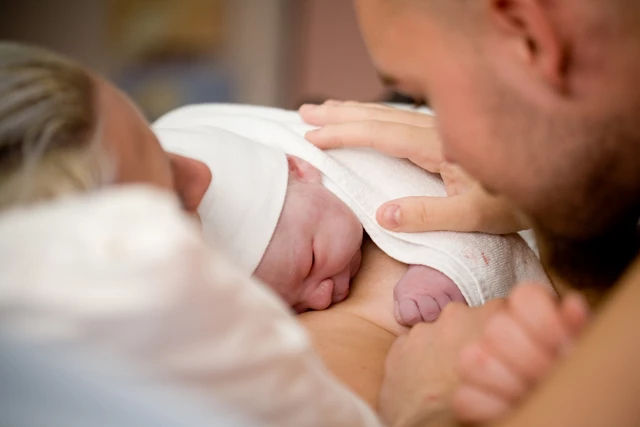Choosing a birth partner
Giving birth can be a daunting prospect but having a trusted birth partner with you can make a significant difference to your experience1. Make sure you and your chosen birth partner both understand the important role they have to play.
Read on to find out why a birthing partner is important, who you should choose as your birthing partner, and how many birthing partners you can have.

Why a birthing partner is important
Having someone you know and trust with you during the birth can significantly improve your experience of labour. Your birth partner can be someone you know and trust, like your partner, mother or close friend, or a doula. Their main role is to give you support, and help you make any decisions during labour and birth, especially if things don’t go quite as expected. They can also provide a comforting source of reassurance and practical help throughout your pregnancy.
During labour, your birth partner should be prepared to:
- Act as your prompter – reminding you to move around and use the breathing techniques you learned at antenatal classes or yoga – and do whatever makes you comfortable.
- Be your communicator – making sure you are aware of any interventions that might be needed and speaking up for you if necessary.
- Be flexible – knowing that anything could happen and being supportive of any new choices you have to make.

My husband knew what I wanted to happen, and more importantly, my reasons why. It helped him make the best decisions for me when things didn’t go quite to plan.
- Joanna, mum to Poppy
Who to choose as your birthing partner
Many women choose their baby’s father as their birthing partner, but you can choose anyone you trust – your mum, sister, a close friend, or even a doula.
A doula offers emotional and practical support before, during and after you’ve had your baby. They can act as your birth partner or as an extra help to both you and the baby. They can accompany you in the hospital or be present at your home if you’ve chosen to have a home birth. However, their job isn’t to replace a midwife. Doulas are trained and experienced in childbirth and their primary role is to enable you to have the most satisfying and empowered experience possible. They provide continual care and objective advice while keeping both you and your birth partner focused on your birth plan.
You can find out more about the philosophy and service of doulas, and search for one in your area at doula.org.uk
During the ongoing coronavirus pandemic, it may help to have a backup birthing partner, as the current guidance from the Royal College of Obstetricians & Gynaecologists2 is that if your birth partner is experiencing coronavirus symptoms, they will not be allowed to go into the hospital with you. You can find out more about this and about giving birth alone here.
How many birthing partners can you have?
During the ongoing coronavirus pandemic, rules around social distancing and the number of people permitted into hospitals are affecting standard protocol. Hospitals are doing everything they can to accommodate your needs and it’s worth checking with your midwife unit, but at the moment, only one birth partner is advised. Your chosen birth partner must not be experiencing any symptoms of coronavirus or have experienced any in the past seven days3.
If you require a caesarean section, and it’s carried out under spinal or epidural anaesthetic, the clinical staff will do everything they can to make sure your birth partner is able to stay with you in the theatre. However, if you require general anaesthetic (where you’re put to sleep), your birth partner will not be able to stay with you in the theatre4. It’s worth noting that this is for safety reasons and would be the case with or without the outbreak of coronavirus.
You can find out more about how coronavirus might affect your birthing partner here.
Next steps
- Share your birth plan with your birth partner
- Ensure they understand your feelings on birthing positions and methods of pain relief
- If there is any chance they may not be available on the day, have a back-up birth partner, just in case
related articles
Read more

Need some help?
You can get quick answers to common questions in our FAQs.
Alternatively, if you need help with general pregnancy or baby advice, or maybe on using or ordering our products - our expert team are always on hand to talk about feeding your baby.
- Bohren MA et al. Continuous support for women during childbirth. [Online].https://www.cochranelibrary.com/cdsr/doi/10.1002/14651858.CD003766.pub6/full [Accessed May 2020]
- The Royal College of Obstetricians & Gynaecologists. Coronavirus infection and pregnancy [Online]. 2020. Available at: https://www.rcog.org.uk/en/guidelines-research-services/guidelines/coronavirus-pregnancy/covid-19-virus-infection-and-pregnancy/ [Accessed May 2020]
- The Royal College of Midwives. Coronavirus Q&A [Online]. 2020. Available at: https://www.rcm.org.uk/coronavirus-qa/ [Accessed May 2020]
- The Royal Collage of Midwives. Labour and childbirth [Online] 2020. Available at https://www.rcm.org.uk/labour-and-childbirth/ [Accessed May 2020]
Last reviewed: 27th April 2020
Reviewed by Nutricia’s Medical and Scientific Affairs Team



